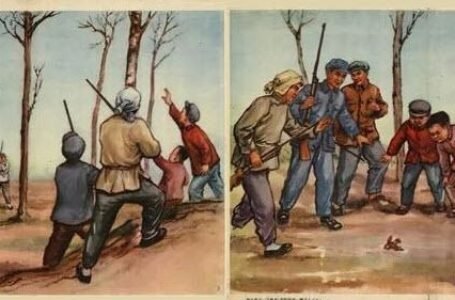Janabai: The Saint Who Broke All the Prisons of Caste to Preach Devotion
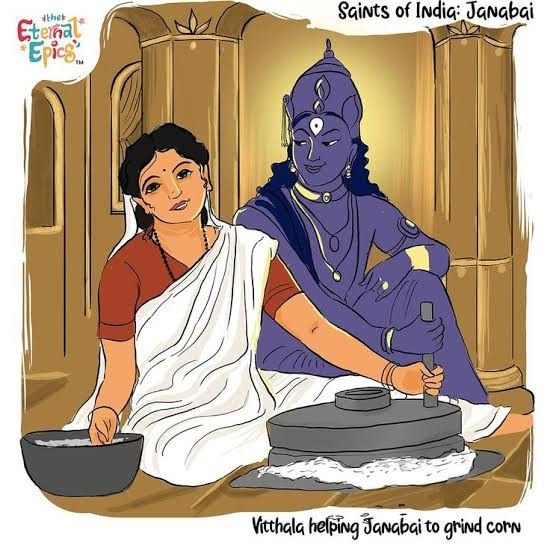
She was a Dalit on top of that a woman. She was born in an era when Dalits were not even allowed to drink from the same well let alone enter the temple. Facing the society was not easy at all. She was attacked left, right, and center. However, she broke all the prisons and barriers of caste to emerge as Janabai – the revered Marathi female saint whose abhangs or devotional poems are sung hitherto. She truly is an embodiment of courage, justice, resilience, for she exemplified great valor in enduring the brutality and inhumanity of society.

She illustrated through her life and abhangs that devotion knows no gender and caste and passionately advocated for feminism and emancipation of caste. Janabai is no doubt a consequential figure in Warkari movement but more than that she has made indispensable contributions to the Dalit Movement.
Her story is a profound source of inspiration imbued with resilience, tenacity, devotion, and spirituality.
The bird flies to the end of
the horizon
and brings food for its young.
The mother-eagle wanders in the sky
but hastens back to her young
Mother is busy with her work
and yet her mind never leaves her child.
Mother monkey jumps over a tree
with her child holding on to her stomach.
Similarly, mother Vitthal watches over Jani
over and over again
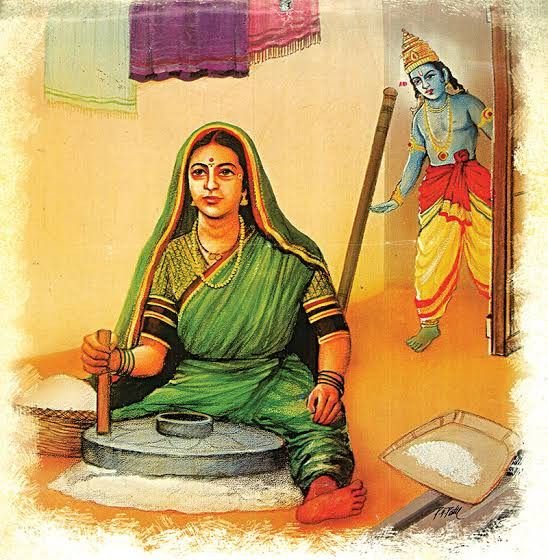
Janabai was born in 13th century in Gangakhed, Maharashtra to a Dalit couple. She had an innate devotion for Vitthal, an avatar of Lord Vishnu. Her mother had passed away in early childhood so it was her father who looked affectionately after her. Janabai couldn’t get any formal education due to the restrictions on women and Dalits back then however, she kept preaching her devotion towards the almighty Vitthal.
According to folklores, at the age of seven she went to Pandharpur with her father. Pandharpur is a significant religious town of Maharashtra. There she got so smitten by the glory and divine spirit and aura of the place that she became adamant in her resolve of not leaving the place ever. Her father tried cajoling her however little adorable Janabai standing her ground firmly declined to leave. Finally caving in, her father left her there and departed. Unfortunately, her father shortly passed away after this incident.
As per another version of the story her father had been commanded by the God in his dream to drop young Janabai to the home of Damasheti, the parents of the poet Namdev, where she was destined to serve Namdev as a housemaid.

Here, little Janabai was found by a little boy Namdev, who would later become one of the greatest Marathi Warkari poets. Pitying Janabai, Namdev brought her into his home where she began working as a housemaid. Janabai was very close to Namdev and always looked up to him as a spiritual guide. Later, as she grew up, she made Namdev her spiritual guru and drawing inspirations from him, she also started crafting poems dedicated to Vitthal.
There is no ounce of crudity or erotica in her poems rather she always revered and cherished Lord Vitthal as a parental figure, a mother, a companion in labor, and someone mundane like her. Janabai’s poems eloquently explore the themes of love, hardwork, resilience, feminism, and a poignant critique of the caste system.
Mother is dead, father is dead
now Vitthal, take care of me.
O Hari, my head is itching
I am your child
and have no one of my own.
Vitthal says to Rukmini,
“There’s no one to care for my Jani,”
Taking oil and comb in his hands
he combs and braids my hair;
finishing the braid he knots it.
I say, now please rub my back.
Jani says, O Gopala,
help celebrate the festival
of the powerless.

Janabai delightedly and diligently kept working as a housemaid faithfully serving poet Namdev throughout her life.
Anecdotes from the Life of Janabai
According to popular legends Lord Vitthal, himself, used to give Janabai a hand in her household chores like grinding grains, making cow dung cakes, and even in composing her abhangs. She always looked up to Lord Vitthal as a companion in labor, a fellow worker whom she even, at times, rebuked. This sentiment has exquisitely been encapsulated in one of her abhangs:
I have no fascination for you, God!
I am not going to serve you any more!
You are not magnanimous
Why do you carry this false pride
of greatness?
What will you gain by getting angry with me?
We the devotees are the source of your strength.
You have no power of your own.
Hari, haven’t I understood your secret?
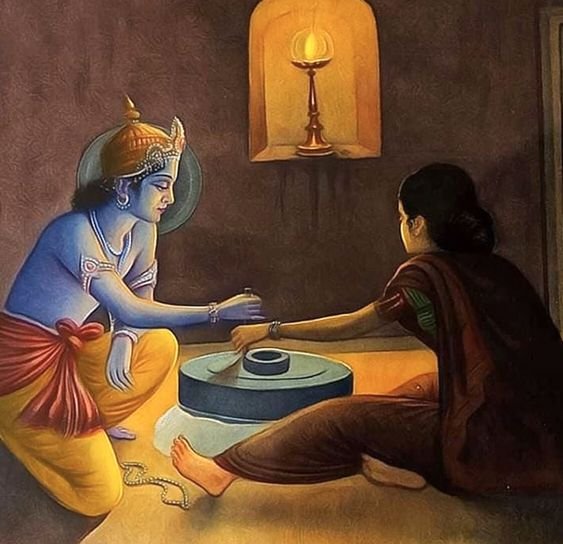
Receiving help and love of Lord Vitthal didn’t come off easy for Janabai, for she was envied and attacked by other devotees for receiving such immense attention, which they were devoid of, from the Lord.
One night the roof of the poet Namdev’s house was blown away due to torrential weather so Lord Vitthal appeared to fix it so that not even a single drop of water enters their house. When Namdev came out he found Lord Vitthal standing there and invited him inside for a meal. However, due to her caste Janabai, who earnestly and desperately wanted to share the meal with Lord Vitthal, wasn’t allowed to eat with him. This left her distraught. To undermine her melancholy Namdev’s wife gave Janabai the leftover of Lord Vitthal. Janabai was chuffed getting the leftover of her lord. This meant a lot to her.
She was sitting in her hut when Lord Vitthal paid her a visit saying, “I have eaten much however I still feel famished. Do you have anything to eat?”
On hearing this Janabai offered him his leftover and they both ate together. The same night Lord Vitthal left behind his necklace and shawl in her hut and went back to the temple since it was going to dawn soon.

However, jealous people seized this great opportunity to accuse Janabai of theft so they all started denigrating her calling her a thief and demanding to raid her hut. When they raided her hut, they indeed found the lost necklace and shawl and brought her to Chandrabhaga to punish her. They tied the poor Janabai to an iron rod however Lord Vitthal, working his magic, turned the rod into water astonishing everyone. People instantly knew that it’s the result of profound devotion of Janabai towards Lord Vitthal. They recognized the purity of her connection with Lord Vitthal.
Achievement
Janabai was and still is a beacon of devotion and spirituality for so called lower caste people. She bravely broke all the barriers and prisons of caste and gender by composing beautiful, captivating, and devotional poems for her Lord. Her contributions are unforgettable and incredible that’s why she is revered till date. Her notable achievements are:
- Literary Legacy
Janabai is known to have composed over 300 abhangs or devotional poems in simple, relatable, and profound Marathi language. Her abhangs are highly pertinent and that is why they are still sung by the devotees visiting Pandharpur.
- Supporting Feminism
Janabai was a feminist. She was born at a time when women were considered a mere object and property of men. Janabai has challenged this cruel and oppressive mentality through her abhangs. In one of her abhangs she has referred Lord Vitthal as ‘Rukmini’s husband’ hence signifying that women also have their own identity. They are not just known by their father’s or husband’s name.
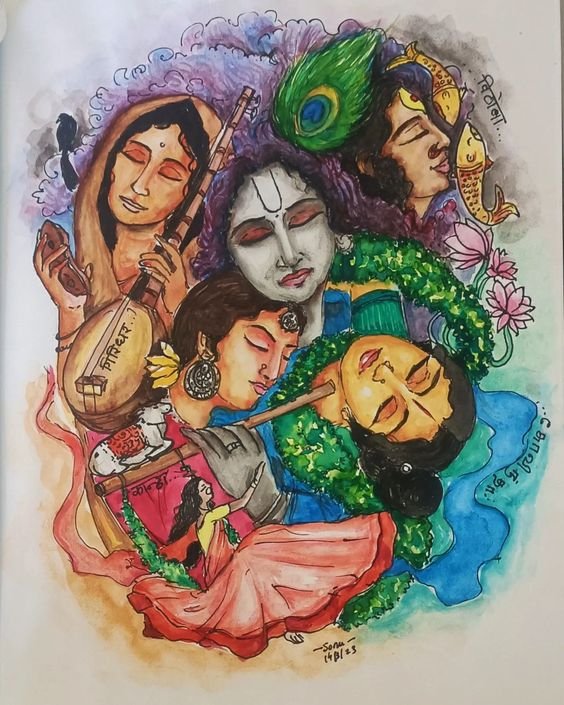
- Contribution to Dalit & Warkari Movement
Janabai underscored through her life and poetry that devotion has nothing to do with caste. All human beings are equal and they should have just rights to enter a temple and worship the almighty. Her love for Lord Vitthal was unparalleled and her life journey is a testament of unarmed and peaceful struggle against caste-based atrocities and discrimination.
- Movies After Her
A movie called ‘Sant Janabai’ was made to pay homage to the divine legacy of Janabai.
- Supporting Other Dalit Poets
Janabai always supported other Dalit poets like Soyarabai and Chokhamela. They are often found mentioned in Janabai’s devotional abhangs.

Legacy
It is said that Janabai left this mortal world in 1350. Janabai is no more with us but her poems will always keep resonating her ideas, her struggles, her love for Lord Vitthal, and her works criticizing the atrocious caste system. Janabai’s abhangs guide us what true devotion means.
Breaking all the forces of caste and gender Janabai emerged as one of the greatest poets of Warkari movement motivating and inspiring us that if you work hard for achieving your dreams then no force can stop you. As a Dalit woman, Janabai intrepidly challenged the societal norms and defied all the barriers to preach her devotion and spirituality.
Her stories continue to inspire people especially in Maharashtra. Janabai was an embodiment of spiritual devotion.
Your wife and mother stay at your feet
and sons are placed proudly in front,
this woman is kept on the doorstep—
no room for the lowly inside.
O God, how I want your embrace!
when will you call dasi Jani your own?


